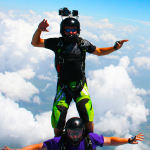-
Content
2 -
Joined
-
Last visited
Never -
Feedback
0%
Posts posted by D0z3r
-
-
Planning a trip down to Mexico after Christmas through the new year and planning on making a few fun jumps in Mexico. Looks like the plan is to drive to Cuaulta from Texas and then down to Acapulco, or maybe to the boogie in puerto Escondido. Was wondering if anybody had more info on the dropzones down there, or has made a similar trip before and had some advice or suggestions of things to do. Anything is appreciated! Thanks!



How to respond to a very serious incident at the DZ as a non medic ?
in General Skydiving Discussions
This is a Great List, But i must add one thing. Sometimes it takes us a little bit to get to the patient, and in that timeframe a lot can change. One of the greatest assists a bystander ever did for me, while not on a dz incident, was to tell me everything the patient said/did before my arrival. sometimes a bystander will have a few minutes with a patient before they go unconscious, use this time to figure out some of the pertinent info I need to go to work! Name, age, allergies, medications, past medical history, where it hurts, and what happened. Can really be helpful for treatment plans when we have this available. other than that, stand back, but stand ready, we usually need help for on and off dz incidents when our backup is a ways out, and if you can follow directions, and maintain a cool and calm head, it does not matter what kind of skills or knowledge you have, you will be a HUGE asset to the medics. My 13 year old little brother was the best helper when someone streamered in on our dz, and there was 20-30 grown adults standing around attempting to help! one of whom i found out later was a nurse..[:|